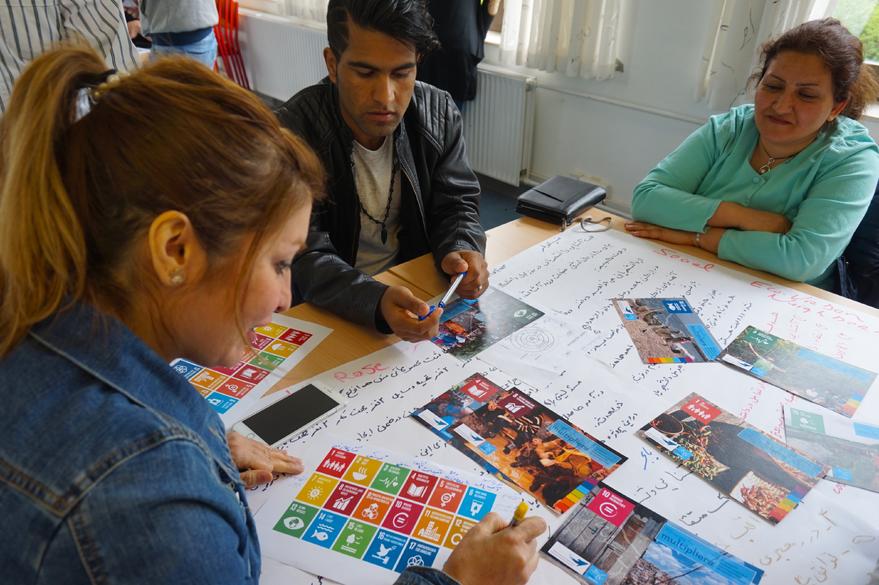Gaia Education in partnership with UNESCO GAP launches SDGs Community Implementation Flashcards

Daniel Wahl, Gaia Education’s head of design and innovation designed flashcard materials to support the participation and implementation of SDGs.
By Daniel Wahl |
In 2016, I was given the task – in my role as Gaia Education’s head of design and innovation – to craft a novel training approach and materials in support of widespread community participation in the implementation of the SDGs at sub-national levels. The recently released ‘SDG Community Implementation Flashcards’ and the training for multipliers ‘Achieving the Global Goals’, are the result of 12 months of intense development work and collaboration within the Gaia Education team.
‘Achieving the Global Goals – One Community at a Time’ is designed to train multipliers by enabling them to facilitate community focussed conversations about how to implement the 17 SDGs and their 169 targets at the local and regional scale in ways that are carefully adapted to the bio-cultural uniqueness of each location.
This highly participatory small group work and question-centered training engages local communities in a process that will turn what might be perceived as top-down goals of the United Nations into meaningful projects that are locally relevant and can be collaboratively implemented by the communities themselves.
The ‘SDG Community Implementation Flashcards’ contain more than 200 questions structured into the four dimensions of Gaia Education’s whole systems approach to sustainability (social, ecological, economic and worldview).
Participants explore these four dimensions for each of the 17 SDGs in small group conversations that invite them to collaboratively identify actions and solutions aimed at implementing the global goals in ways that are relevant to their lives and their communities. The training offers an effective way of creating local community ownership of the SDGs and hence local participation in SDG implementation.
Each SDG card has some background information (figures, facts, and trends) relevant to a particular SDG. This background information is presented through the lens of Gaia Education’s 4-dimensional whole systems design framework and offers a social, worldview, economic and ecological perspective on that particular SDG.
In addition each card has four questions – or series of questions – that invite people to have a conversation about: How is this SDG relevant for our community? Are there already projects in our community or city that help to implement this particular SDG? If yes, what can we do to support these efforts? If no, what kind of project could we start to strengthen the local implementation of that particular SDG? During the training of multipliers a lot of emphasis is put on the systemic interrelationships between the 17 SDGs and how to strengthen them.

In a variant of this process different groups can work on SDG implementation at different scales: local, regional, national and global. This can lead to interesting conversation about how to create synergies between these scales (vertical integration). Each workshop also offers an opportunity for at least some of the participants to begin practicing their own facilitation skills as they use the cards to focus small group conversation and help their group harvest key insights and possible next steps.
There is also always a feedback and evaluation round at the end of each training and a brief conversation about how the group can stay in touch to promote SDG implementation in their region. Some time is dedicate to explaining how best to collaborate with Gaia Education in becoming multipliers in the use of the ‘SGD Community Implementation Flashcards’ and use the cards to replicate the training for multipliers.
Gaia Education has run first training for multipliers in Germany, Spain, Denmark, Brazil, Canada, Thailand, Scotland and Argentina. The flashcards and the associated training for multipliers have been reviewed by UNESCO and met with enthusiastic feedback. The flashcards are already available in English, Spanish and Portuguese and UNESCO is providing support for translations into Arabic, Chinese, French and Russian.
As a key partner within the UNESCO ‘Global Action Programme on Education for Sustainable Development’ (GAP), Gaia Education has joined the ‘Accelerating Sustainable Solutions at Local Level’ partner network. Over the coming months and years we will continue to creatively weave the use of the ‘SDG Community Implementation Flashcards’ and the methodology of its ‘Training of Multipliers’ into most of our face-to-face courses.
The overall objective is to make the Sustainable Development Goals work for communities everywhere. The training for multipliers aims to build will and capacity within local communities to actively engage in SDG implementation. Only together we can achieve Agenda 2030 and co-create a world that works for all — one community at a time! You are shaping this future too!


0 comments
Leave a comment